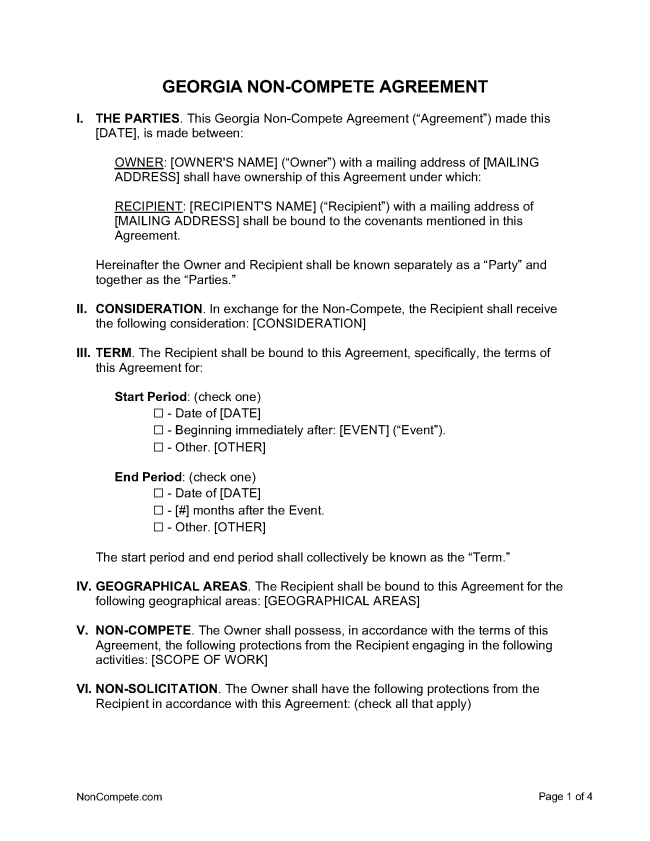A Georgia non-compete agreement is a limitation on the ability of an employee to carry out work in a particular field, over a specific geographic area, for a defined time, or some combination of the three.
Businesses can use non-compete agreements in Georgia, but they are considered difficult to enforce relative to other states. Agreements arising from a business’s sale are more likely to be enforced than those stemming from an employment contract.
Table of Contents |
Are Non-Competes Enforceable in Georgia?
Yes. Georgia courts can enforce non-compete agreements if
- They support a legitimate business interest;
- They are applied to an employee who has regular contact with customers and is in a sales or management position; and
- They are reasonably limited in duration, geographic area covered, and the activities restricted.
Level of Scrutiny
The level of scrutiny with which courts examine non-compete agreements depends on the source of the agreement.
- Non-compete agreements contained in an employment contract receive strict scrutiny.
- Non-compete agreements arising from the sale of a business receive little scrutiny.
- Non-compete clauses in professional partnership agreements receive an intermediate degree of scrutiny.
Reasonableness
Whether a non-compete agreement is reasonable depends on three factors:
- The geographical reach of the limitation
- The duration of the limitation
- The scope of the activities that an employee is prohibited from pursuing.
Reardigan v. Shaw Industries (1999).
Geographic Reach
A non-compete agreement must be specific about the territorial limitations where former employees know they are not allowed to conduct business. (W.R. Grace & Co. v. Mouyal (1992)).
Agreements preventing a former employee from operating in the territory they used to work are presumed valid. (Reardigan v. Shaw Industries (1999)).
Geographic limitations related to the territory where a former employee used to work are much more likely to be upheld than those concerning the entire region where the former employer does business. (Howard Schultz & Associates of the Southeast v. Broniec (1977)).
The territory covered by a non-compete agreement must be established when the agreement is signed; agreements that permit a former employer to add territory restrictions after signing are not enforceable. (New Atlanta Ear Nose and Throat Associates v. Pratt (2002)).
Scope of Activity
Restrictions in a non-compete agreement on what a former employee may do in the future are considered with the limits on the employee’s activity. Restrictions beyond calling on clients the former employee served must generally be limited to the territory where the employee worked. (Paramount Tax & Acct., LLC v. H & R Block E. Enterprises, Inc. (2009)).
Trade Secrets
Georgia law does not require a non-compete agreement or contract to prevent a former employee from disclosing trade secrets. Ga. Code § 10-1-762.
However, valuable business information that does not meet the definition of Georgia’s Trade Secrets Act may be validly protected through a non-compete agreement. (Sunstates Refrigerated Services, Inc. v. Griffin (1994)).
Prohibited Professions
Lawyers may not enter an employment agreement or partnership agreement that limits a lawyer’s right to practice after the relationship concludes, except for agreements concerning retirement benefits. Lawyers also may not settle a case in such a way that restricts their right to practice. Rule 5.6, Georgia Rules of Professional Conduct.
Physicians may be subject to non-compete agreements resulting from the sale of a medical practice or a professional partnership agreement. (Physician Specialists in Anesthesia v. MacNeill (2000)).
Terminating an Employee
There are no appellate cases deciding whether terminating an employee makes a non-compete enforceable against the employee. However, the use of the word “termination” throughout Ga. Code Ann. § 13-8-53(a) does not distinguish between an employee or an employer termination, suggesting that it may be enforceable in either case.
Burden of Proof
The party seeking to enforce a non-compete agreement has the burden of proving that, if the agreement is not enforced, the former employee would be able to target clients the former employee served while working for the employer. (Howard Schultz & Associates of the Southeast v. Broniec (1977)).
Continued Employment (Consideration)
Continued employment is sufficient consideration to support a non-compete agreement that is part of the sale of a business. Still, it is not clear that a non-compete agreement in an employment contract where the only consideration is continued employment is enforceable. (S. Hammond Story Agency, Inc. v. Baer (1991)).
Maximum Term
No statute specifies the maximum term for a non-compete agreement, and Georgia courts have declined to set a maximum amount. However, they have upheld limitations for as long as five years. (Johnson v. Lee (1979)).
Blue Penciling
If a particular provision of a non-compete agreement contained in an employment contract is unreasonable, the entire agreement is unenforceable. However, suppose a provision in a non-compete agreement that is ancillary to the sale of a business is unreasonable. In that case, a judge may eliminate the unreasonable portion to make the rest of the agreement enforceable. (Advance Technology Consultants v. Roadtrac (2001)).
